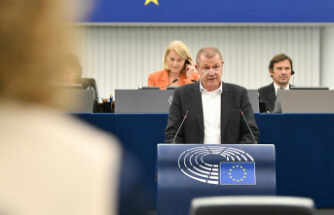The Ministry for the Ecological Transition and Demographic Challenge prepares a Royal Decree to regulate the containers and residues that it raises that in 2023 it is forbidden to sell fruits and vegetables in plastic containers and that drinks are offered in reusable containers in all retail establishments. The larger ones must offer up to seven distinct references and dedicate part of their space for bulk sale that consumers will store in their own bags or containers, bottles included.
The measures, focused on the reuse of containers and recycling, will impact consumers mainly in these two aspects. In the case of retailers, in addition to the relevant changes in recycling, they must enable zones and inventory to comply with demands, while manufacturers will have to strive to increase the percentage of recycled plastic. In any case, from 2023 there will be less than this material in the supermarkets.
"It is scandalous that they sell a banana surrounded by plastic," resume Carlos Arribas, responsible for residues of ecologists in action. The organization values very positively a measure that could solve something "completely absurd", but believes that the limitation by number of references in the case of reusable products falls short. In practice, he regrets, can be resolved with a small number of beverages that do not really necessarily offer an offer according to demand. "The consumer has the right to offer a reusable reference of the products he consumes," argues argues.
The objective of the Government is to reduce the total weight of the packaging waste, by 13% by 2025 and 15% by 2030, in both cases with respect to the data of 2010. In addition, they expect that in 2030 all containers placed on The market is 100% recyclable and, whenever possible, reusable.
Fuentes de Fiab, the Spanish Federation of Food & Beverage Industries, fear that it will not be possible to achieve this point: "Our concern is that to meet the legal requirements, we have PET and recycled plastics in quantity and the quality necessary for Be in contact with food ". Today, they explain "We believe that it will not be possible to have availability for all companies that choose to incorporate plastic and PET recycled to their containers." They are also concerned about "the high impact" that would have in companies a "radical change in their structures and business models" that could put "at risk" their viability.
Meanwhile, from retailers they ask that these measures be very clear and, above all, take into account the entire value chain. Thus, for example, remember that they are not the ones who pack the fruits, but depends on the supplier and be done by various logistical implications, of product duration or use of these. "An analysis of economic, social and environmental implications is necessary," explains María Martínez-Herrera, head of food security and environmental security.
"The packaging is not done for pleasure," he continues. "That does not mean that you have to work in seeing what container is superfluous and could be removed," she adds. Also, he recalls that "a rational use of plastic does not mean prohibiting plastic; or we have to do is recycle it well, that I do not finish where you do not have to finish."
With regard to bulk sale, which is already fostering, "Martínez-Herrera returns to appeal to dialogue:" We want them to be clear about it. " "We can not leave this control of hygiene in the hands of supermarket workers," he explains in reference to amendment amendment to Article 18 presented by the Socialist and United Public Parliamentary Group. It establishes that surface establishments equal to or greater than 400 square meters must devote at least 20% of their sales area to products without packaging.
For this, "they should accept the use of reusable containers" as tapas, bottles or bags "suitable for the nature of the product and duly sanitienized". The amendment puts this burden of conditioning on the shoulders of consumers, but the final decision will depend on the merchant, which may reject them. "15 million people make the purchase every day; that must be taken into account," recalls Martínez-Herrera and this would mean changes that would come even to the scales, which should be able to discount the package of the containers.
On the other hand, in article 9, dedicated to the reuse measures of establishments, it is established that these stores must offer a minimum of beverage references with reusable containers according to their surface, in addition to providing the return service of reusable containers.
In the case of those with less than 120 square meters, the obligation will be limited to a single reference (ie, a single drink with reusable container). Retailers from 120 to 300 square meters will increase the offer up to a minimum of three references. In both cases they will have a maximum period of 18 months to do so.
For its part, larger establishments will be reduced by the deadline for 12 months and must have at least four references (those of 300 or more square meters and less than 1,000), at least five (between 1,000 or 2,500 m2) or At least seven products if you exceed 2,500 square meters of surface. The minimum references, in any case, may be increased by ministerial order.
Again, from the sector they are open to this, but request that the current reality be taken into account. The famous helmets of four decades are still present in the memory of many, but those 40 years have brought with them new customs and the industry has adapted to it. Also, remember that this would also have an environmental cost in logistics and water used to recycle the containers.
On the contrary, the environmental associations consider that the measure could be much more ambitious. Thus, they believe that an offer between one and seven products will be scarce: "We celebrate that the vector of reduction and reuse has finally been introduced, but it is not very ambitious in front of the magnitude of the problem we have," Arguye Rosa García, General Director of Rezero. "This law should ensure the right of consuming people to consume without generating waste and without affecting our health," continues, but falls short: "It is a drop in the desert."
Date Of Update: 22 September 2021, 20:20











